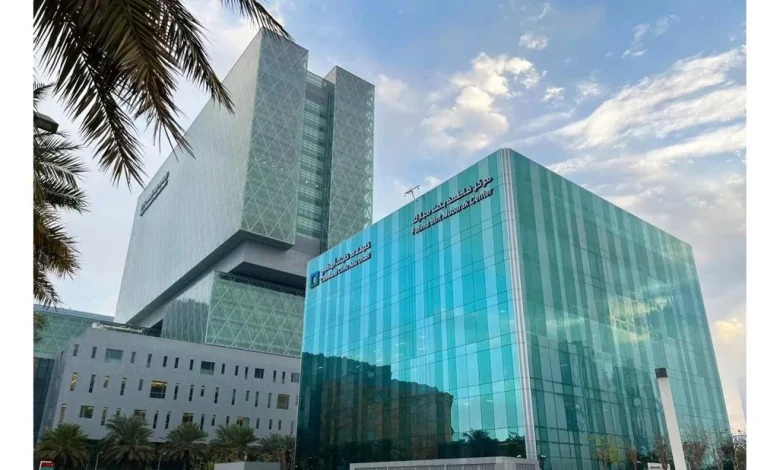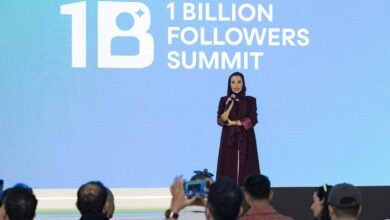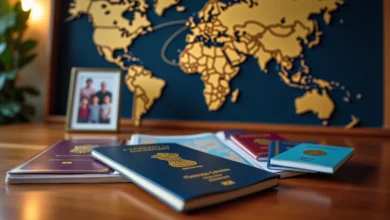
UAE Cancer Center Brings Next-Gen Treatment to Middle East
UAE’s most advanced cancer center leads the way with wearables, robotic surgery, and carbon-ion therapy that revolutionize oncology care in the Middle East. The country has become a global hub for advanced medical treatments and provides world-class healthcare to patients from around the world. Abu Dhabi will soon house the Middle East’s first heavy ion cancer therapy facility, making it one of just 15 such centers worldwide.
The UAE’s cancer treatment capabilities have made remarkable progress through innovative technologies that reshape patient care. The Fatima bint Mubarak Center’s Ethos adaptive radiotherapy uses AI and machine learning to modify treatment plans live. UAE cancer hospitals’ robotic surgery systems have improved precision with minimal invasiveness. The country’s biggest achievement lies in its local manufacturing and training for chimeric antigen receptor (CAR) T-cell therapy, which will cut treatment costs by up to 90 percent. This innovative approach allows patients to receive advanced treatments without lengthy hospital stays.
UAE Launches Next-Gen Cancer Center with Global-Standard Facilities
Image Source: Cleveland Clinic Newsroom
The UAE has revolutionized its healthcare system by building world-class cancer treatment facilities that match global standards. Two major institutions now lead this progress and bring specialized oncology care to patients across the Middle East.
Cleveland Clinic Abu Dhabi and Burjeel lead breakthroughs
Cleveland Clinic Abu Dhabi’s integrated approach helps diagnose and treat cancer with multidisciplinary expertise. World-renowned experts lead the hospital’s innovative facilities to provide specialized treatment options. Patients can access specialized care through its detailed cancer programs for various cancers including breast, eye, gastrointestinal, colorectal, liver, pancreatic, genitourinary, and blood cancers.
Burjeel Cancer Institute, part of Burjeel Medical City under Burjeel Holdings, has become Abu Dhabi’s leading oncology provider. The institute blends innovative technology with medical expertise to deliver advanced treatment options. Burjeel’s excellence shows through its many international accreditations. These include CARF Accreditation for healthcare excellence, Zenith Global Health Award for innovation, Temos Certification for medical tourism, European Society for Medical Oncology (ESMO) Accreditation, and Joint Commission International (JCI) recognition.
Burjeel Holdings’ partnership with U.S.-based non-profit Caring Cross will help manufacture CAR-T cell therapies locally. This budget-friendly collaboration could reduce treatment costs by up to 90% compared to international prices.
Fatima bint Mubarak Center sets new regional standard
The Fatima bint Mubarak Center at Cleveland Clinic Abu Dhabi has created new standards for cancer care in the region. His Highness Sheik Khaled bin Mohamed bin Zayed Al Nahyan, Crown Prince of Abu Dhabi, inaugurated the center in March 2023. The center has since helped over 3,000 new cancer patients in its first year. Patient care includes more than 30,000 clinic visits, 6,000 radiation treatments, 6,500 chemotherapy infusions, and 7,000 imaging studies.
The center follows Cleveland Clinic’s Taussig Cancer Center’s model—one of America’s top cancer facilities. Its multidisciplinary approach offers services from screening and diagnostic testing to advanced radiation treatments and precision cellular therapies.
M42 and Cleveland Clinic Abu Dhabi have joined forces with Toshiba Energy Systems & Solutions Corporation. Together, they will build the Middle East’s first heavy-ion therapy facility. Construction near the Fatima bint Mubarak Center will start in 2026. Only 15 such centers exist worldwide, with none within a five-hour flight from Abu Dhabi. This development makes the UAE a global leader in oncology breakthroughs.
New Technologies Transform Cancer Treatment in UAE
Image Source: Medical Tourism in India – Medical Tour, Cost, HMSDESK
State-of-the-art technologies at UAE cancer centers revolutionize treatment approaches and give patients tailored and better care options. These advances bring substantial improvements in precision medicine to cancer patients across the region.
Ethos adaptive radiotherapy personalizes daily treatment
The Fatima bint Mubarak Center now uses Ethos adaptive radiotherapy, a revolutionary cancer treatment technology that uses artificial intelligence and machine learning to adapt treatment plans in live conditions. The system adjusts radiation delivery based on daily changes in patient’s anatomy—something doctors thought impossible before. AI-powered technology helps reduce adaptive treatment time to about 25-30 minutes per session. We used this technology for pelvic, abdominal, bladder, and prostate cancers. This precise approach keeps radiation away from healthy tissues.
Edge radiosurgery offers non-invasive precision
Edge radiosurgery stands out as another breakthrough in UAE cancer treatment. This accurate, non-invasive technology uses stereotactic radiation to target cancer cells with precision while protecting healthy ones. The system delivers focused radiation beams that work especially when you have complex cases needing exceptional precision. UAE’s leading oncology centers now see this technology as a vital part of their complete cancer care.
AI and robotic surgery improve accuracy and safety
Robotic surgical systems revolutionize cancer treatment in the UAE. Cleveland Clinic Abu Dhabi completed UAE’s first robotic mastectomy using the Da Vinci single-port system. This enhanced surgeon’s vision and control through minimal incisions. Patients experience fewer complications, less scarring, and faster recovery. The hospital also led the world’s first remotely operated transcontinental robotic-assisted focal therapy for prostate cancer by working with experts in Ohio.
Radioembolization targets liver tumors with minimal side effects
Radioembolization (TARE-Y90 therapy) proves effective for liver cancer treatment. This FDA-approved minimally invasive procedure sends radioactive microspheres straight to liver tumors through blood vessels. The targeted method destroys tumors while saving healthy tissue. Patients usually feel only mild side effects like fatigue, poor appetite, and mild abdominal pain that go away within 1-2 weeks. This therapy helps patients with inoperable tumors live years longer instead of months.
Specialized Therapies Expand Access to Complex Cases
Image Source: Khaleej Times
UAE patients with complex cancer cases now have new hope thanks to breakthrough specialized therapies that expand their treatment options.
CAR T-cell therapy offers hope for blood cancers
The region has seen a game-changing development in blood cancer treatment through Chimeric Antigen Receptor (CAR) T-cell therapy. This state-of-the-art immunotherapy changes a patient’s immune cells genetically to find and kill cancer cells. The results in treating leukemia and lymphoma have been remarkable. The process takes T-cells from the patient’s blood and reprograms them in a lab to spot cancer cells before putting them back into the patient. These modified cells work like a “living drug” and keep protecting against cancer coming back. This engineered cell therapy shows great promise with over 25,000 patients treated at 455 centers worldwide.
Heavy ion therapy to treat radiation-resistant tumors
Heavy ion therapy, particularly carbon ion therapy, is changing how doctors treat cancers that resist radiation. The Middle East’s first heavy ion therapy facility is under construction at Cleveland Clinic Abu Dhabi, through a strategic collaboration with M42 and Toshiba Energy Systems & Solutions Corporation. This advanced radiation therapy uses carbon ions that are 12 times heavier than protons. These ions move at nearly 70% of light speed to reach deep into tissues. The treatment works exceptionally well for tumors that don’t respond to standard treatments, including:
- Certain head and neck cancers
- Lung and liver cancers
- Sarcomas and recurrent tumors
The technology damages tumor DNA more effectively than traditional radiation while keeping side effects minimal.
Local manufacturing reduces treatment costs by 90%
The cost of these advanced therapies has become more manageable through smart planning. Burjeel Holdings has worked with US-based non-profit Caring Cross to make CAR-T cell therapies locally. This partnership has cut costs by up to 90% compared to international rates. Global CAR-T therapies typically cost between AED 1.28 million and AED 3.67 million, so this huge reduction makes treatment available to many more patients. Abu Dhabi Stem Cell Center achieved a milestone in 2023 by creating the UAE’s first CAR-T cells to treat an 11-year-old boy with leukemia. These projects create a lasting framework to deliver state-of-the-art therapies throughout the MENA region and beyond.
Multidisciplinary Teams and Patient-Centered Models Improve Outcomes
Image Source: ATD
The UAE cancer centers’ life-blood lies in their human expertise and detailed care models, which go beyond advanced facilities and technologies. The region’s successful cancer treatment stems from specialized teams and patient-first approaches.
Internationally trained oncologists and radiologists cooperate
UAE hospitals’ cancer care relies on Multidisciplinary teams (MDTs) that bring experts from specialties of all types to create tailored treatment plans. Leading institutions like Cleveland Clinic Abu Dhabi, Burjeel Cancer Institute, and Mediclinic Middle East’s teams consist of:
- Medical oncologists and surgeons
- Radiologists and pathologists
- Specialist nurses and genetic counselors
- Nutritionists and physiotherapists
Dedicated tumor board meetings review each cancer case. Specialists work together to assess treatment options based on the latest evidence. This shared approach gives patients multiple expert views instead of a single physician’s assessment. These teams often include professionals with training from prestigious institutions in the US, UK, and Europe, which brings global expertise to local care.
Outpatient care models reduce hospital stays
Patient treatment has changed through innovative ambulatory care models. A new private ambulatory cancer center in the UAE follows global oncology guidelines. Patients receive chemotherapy, immunotherapy, and targeted treatments without overnight stays. This approach maintains high standards while giving patients more convenience and flexibility. Complex therapies cause minimal disruption to patients’ daily routines.
Support services has nutrition, counseling, and pain management
Cancer care goes far beyond medical treatment. UAE cancer centers have developed extensive support services that address emotional and physical challenges. Cleveland Clinic Abu Dhabi’s Palliative and Supportive Care team consists of physicians, advanced nurse practitioners, social workers, and psychologists who work among primary oncology teams. Majlis Al Amal, a unique initiative by Al Jalila Foundation that’s free of charge, gives female cancer patients dedicated community spaces to connect, access information, and join wellness activities.
UAE Establishes Itself as a Regional Leader in Cancer Care
UAE leads oncology breakthroughs across the Middle East and beyond. Patients can now receive treatments locally that once required international travel. This remarkable shift shows how the country combines advanced technology with world-class medical expertise.
The healthcare landscape has changed with technologies like Ethos adaptive radiotherapy, Edge radiosurgery, and robotic surgical systems. Specialized treatments such as CAR T-cell therapy and the upcoming heavy ion therapy facility give hope to patients with complex cancers. Local manufacturing has made these advanced cancer treatments available to more people in the region.
Medical teams work together to create treatment plans that work better than individual specialists working alone. These plans go beyond just medical care and include nutrition, psychological support, and social aspects. Patients maintain their quality of life during treatment thanks to this complete care model and innovative outpatient systems.
UAE cancer centers have made it unnecessary for most patients to travel abroad for treatment. New facilities like Fatima bint Mubarak Center at Cleveland Clinic Abu Dhabi and Burjeel Cancer Institute show the country’s steadfast dedication to healthcare excellence.
UAE has become the region’s hub for cancer treatment, leading to better patient outcomes. We have a long way to go, but we can build on this progress to help more people. The mix of advanced technology, medical expertise, and patient-focused care creates a treatment model that serves the entire region well.






